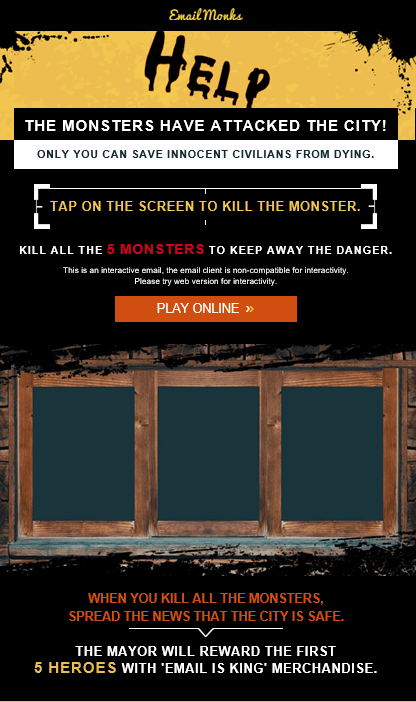Gamification is an interesting way to engage your subscribers. It is a relatively new approach that is not as explored as GIFs and other rich media elements. By including a game in your emails, you can inspire your subscribers to interact and win a reward in return.
Using Gamification Strategy in Holiday Emails (Halloween and Thanksgiving)
EmailMonks loves creating a memorable email experience for subscribers and so the developers put together an interactive game for the Halloween email. The subscriber was supposed to save the city from the attack of five monsters. The email used GIF animations in the backdrop and the game took the center stage.
Since the email couldn’t work in email client Outlook, those subscribers were provided an option to click through and play the game online. As much fun as it was to create the email, we are pretty sure it was equally delightful for the email recipients.
This email has been created using multiple interactive components in a well-arranged way to give users the gamification experience. It contains keyframe animations with five rounds of the game and each round appears at the right time by including delay in the animation.
We have added input tags (click events) to allow subscribers to interact with the game. All the inputs have their own individual actions and re-actions. Depending on the actions by the subscribers, the winning or failure message will be displayed.
Developing a gamification email is quite challenging but making it compatible across all email clients is even more challenging as not all of them support these emails. Therefore, it is imperative to display the right message with a fallback version.
As you can see with this email, the non-supportive email clients will show a custom message, depending upon the email client in which the email is opened so that the reader can experience the interactivity as desired.
E.g.: This is how the fallback version will appear if it’s been viewed in Gmail.

Thanksgiving Email – Cross the Maze
Maze is a game loved by individuals belonging to every age group.
We brought it alive in emails by creating the first email maze along with a gaming console – all in the email itself.
We principally added keyframe animation in the email. To make the game more enjoyable, we created inputs as action points. Based on the selections of various inputs, we assigned re-actions and animated background positions. Similar to what we did for the Halloween email, we created inputs for defining win and lose messages.
We created a character, Alex, and built a story around him. He was stuck in traffic and the player had to help him reach home in time.
The controller was placed at the bottom of the email. It was developed with background inputs, which relied on the actions that ultimately moved the position of Alex. Choosing an incorrect path would lead to a dead-end and showed an error (lose) message. On the other hand, choosing the right direction and helping Alex get to his home displayed a win message.

Compatibility
These gamification emails are compatible in Apple Mail (both Mac and iPhone), Outlook 2011 and Android Native All.
Fallback
Unlike usual fallbacks, this time we created personalized fallback for respective email clients.
For all the non-supportive email clients, a customized fallback message was rendered based on which email client was used to view the email. We accomplished this by using an email client-specific conditional code.
Performance of Gamification Email Campaigns
The best way to measure the engagement in a gamification email is by the ‘time spent’ on that email rather than the click-through rate.
Normally, the email campaigns get around 55% read time.
The average read time of gamification emails is around 60%, which is around 5% more than the usual emails.
Need any other reason to execute it in your strategy?
Wrapping Up
If you want to create a similar gamification email, EmailMonks can help you out.
Just get in touch with all your requirements and Monks will get the work done.
The post Evolution of Gamification in Email: A New Approach to Enhance Engagement appeared first on Email Monks Blog: Email Marketing Tips & Best Practices.